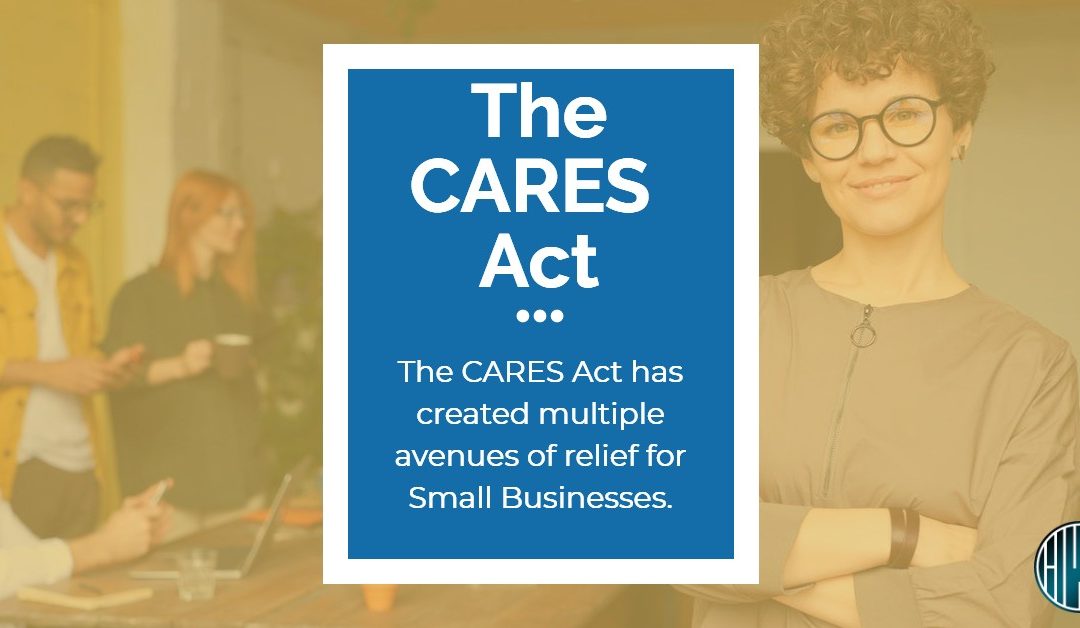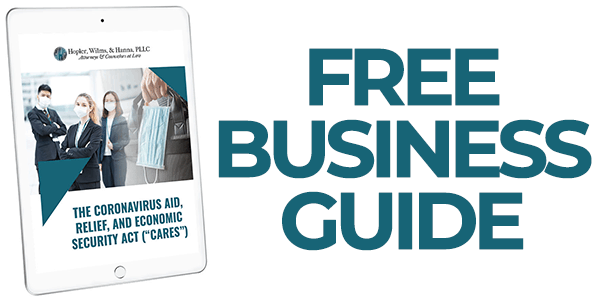On Friday, March 27, 2020, the Coronavirus Aid, Relief, and Economic Security Act was signed into law.
The CARES Act was enacted for the purpose of offering much-needed relief to businesses and individuals negatively impacted by the COVID-19 outbreak. The Act focuses on, among other things, offering disaster relief loans to corporations, small and large, direct cash payments to individuals, and extended unemployment insurance benefits. This blog focuses on what this could mean for our business clients and the changes to UI benefits.
Small Business Loans, Grants, and Loan Forgiveness
In addition to the other programs and forms of relief, the CARES Act utilizes the existing Small Business Administration (“SBA”) Payroll Protection Program loan system to get relief to small businesses that have been impacted by COVID-19.
The existing structure has been amended to enable requests to be expedited and streamlined with the hope that these loans will enable small businesses to better maintain their workforce. Additionally, these loans will be made without a personal guarantee or collateral requirement. In order to qualify for these loans, a business must have less than 500 employees (with a few exceptions).
The Payroll Protection Program loans may be used by a business to pay for payroll expenses, including sick leave, as well as, property rent, mortgage payments, and utilities. Furthermore, a business utilizing these loans may have up to 100% of their loan forgiven if they maintain their workforce at the same capacity as it was pre-COVID-19.
The forgiveness amount is reduced proportionally based on the reduction in the payroll of the company, which is determined both by the number of workers employed and the salaries they receive.
Additionally, the loan forgiveness is capped by the actual covered costs for the business for the first 8 weeks of the loan. From a practical perspective, this means that while a business can take out a loan amount that can assist in maintaining the operation of the business for a year or longer, the forgiveness will be for only 8 weeks of covered operating costs.
The remaining balance of the loan will be repayable over a period of up to 10 years at less than 4% APR interest with the beginning of payments deferred for 6-12 months with the SBA lending partners determining the specific terms of each loan on a case-by-case basis.
As an alternative, businesses in particularly dire situations and requiring immediate relief can petition to have an emergency grant of up to $10,000 as part of an Economic Injury Disaster Loan (EIDL) application.
These emergency grants do not need to be repaid and should be made available within 3 days pending a credit check. However, any amounts received this way cannot be used in conjunction with a Payroll Protection Program loan, and any funds received would need to be refinanced into the Payroll Protection Program loan and would offset some of the loan forgiveness under that program.
In evaluating these programs and which is right for your situation, there are a few things to keep in mind. First, you can only have one of these loan applications pending at any time, and you cannot have more than one loan active covering the same expenses (eg. payroll expenses). This means if immediate relief is required, then you may need to file for a grant under the EIDL application, and then later refinance that into a Payroll Protection Program loan. Similarly, a business looking to maximize their relief may look to that 8-week forgiveness and limit their loan to that amount to minimize their loan principal. However, that may cause issues at a later date if they need to dip back into the program for another loan. Furthermore, businesses need to evaluate that most of these forgiveness and tax credits under the CARES Act are calculated based on the retention of employees and payroll. If a company does not expect that they can retain their payroll at pre-COVID-19 levels, these loan programs may not be ideal.
Small businesses that are seeking relief under these programs should consult with an attorney and/or financial advisor who can help direct them to the appropriate program. However, for those that wish to go it alone, you can contact the SBA at https://www.sba.gov/page/coronavirus-covid-19-small-business-guidance-loan-resources to get paired with an SBA qualified lender.
Unemployment Insurance
Through the Act, Congress has directed $250 billion dollars in economic aid to be issued to State Unemployment Insurance benefit programs.
While North Carolina awaits further guidance, as per the disclaimer issued on the Division Employment Security (DES) website (www.des.nc.gov ), it is anticipated that qualifying citizens that file for benefits for the weeks of April 4 through July 31 will receive an additional $600.00 per week. It also expected that the DES will implement the extension of UI benefits to December 31st as required by the Act.
One major temporary change to UI law as established by Congress is the broadened terms of who qualifies for benefits. For citizens impacted by the virus outbreak who served as self-employed, independent contractors, they will now be qualified for benefits under the Act.
Congress acknowledged the impact that “gig economy workers” were being especially hit hard by the economic effects of the outbreak. It is anticipated that employees from hairdressers to Uber drivers will now be able to file and receive benefits during this pivotal time.
Payroll Tax
The Act also creates some changes to the Payroll Tax (FICA, Social Security, and Medicare) obligations of employers until December 31, 2020. Any Payroll Taxes obligations for employers can be deferred for up to 2 years, with 50% of the deferred amount due December 31, 2021, and the balance due December 31, 2022.
This deferment only covers the employer’s portion of the Payroll Taxes.
Employees will still have to pay their portion, and Employers will still be responsible for withholding and remitting the Employee portion as normal. However, if a business is enrolled in one of the SBA loan programs which allow for loan forgiveness, then they are not eligible for deferment of their Payroll Tax obligations.
Additionally, certain employers may receive a Payroll Tax credit if their business was fully or partially suspended because of Government orders or has a significant decline in gross receipts of more than 50% as a result of COVID-19. Tax credits differ from deferments in that they are applied against the taxes owed instead of just postponing your obligations to another year. Additionally, these tax credits may be eligible for a refund to the Employer if they result in an overpayment of taxes at year-end.
Employers can receive a credit of up to $5,000 per employee if the Business has 100 or fewer full-time employees. For Employers with over 100 employees, they can also be eligible for a tax credit; however, it is calculated based on slightly different criteria.
Finally, like with the Payroll Tax deferral program, Businesses that take SBA loans are not eligible for the credit.
In Conclusion
The CARES Act has created multiple avenues of relief for small businesses, their owners, and their employees.
However, there is no one-plan-fits-all solution. Each program is tailored to a specific need and often they are exclusionary of one another. This creates a situation where a business may only have one bite at the apple to determine how they are going to utilize these programs to weather the crisis we all find ourselves in.
As such, it is important to retain the services of professionals like attorneys and financial advisors to determine your business needs and which program will best address those needs.
At Hopler, Wilms, and Hanna, we are committed to keeping up with the day-to-day, sometimes hour-by-hour changes that impact our small business clients so that we can offer the best counsel possible.
We know the law. You know your business. Together, we can get through this.


